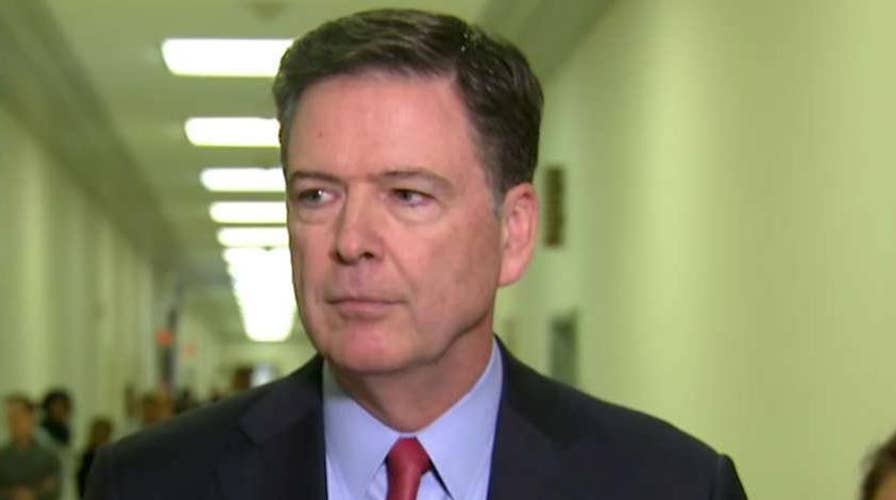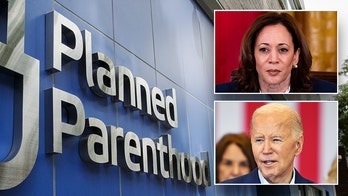Comey: Stand up for the values of this country
Former FBI director James Comey speaks after second testimony on Capitol Hill.
Former FBI director James Comey blasted House Republicans on Monday after exiting what he described as a “frustrating” closed-door hearing -- his second Capitol Hill appearance this month where he was called to answer questions on the Russia and Hillary Clinton email probes.
“Someday, they'll have to explain to their grandchildren what they did today," a defiant Comey said of the Republicans on the two House committees that conducted the interview, accusing them of not defending the FBI from President Trump’s attacks.
Republicans, for their part, have accused Comey of not being forthcoming. He was called back to Capitol Hill after an appearance in early December in which he repeatedly claimed not to know or remember the answers to numerous questions. Rep. Jim Jordan, R-Ohio, told reporters he was not satisfied with Comey's answers on Monday, either.
Comey, though, cast the questioning from lawmakers on the House Judiciary and Oversight committees as political and defended his own leadership, under which agents investigated Clinton and began probing relationships between the Trump campaign and Russia.
“We had to make very hard decisions in 2016,” Comey said. “I knew we were going to get hurt by it. The question was how do we reduce the damage.”
Asked by Fox News' Catherine Herridge if he bears any responsibility for the FBI's reputation taking a hit, he responded, "No."
Speaking to reporters after the hearing, Comey called it “frustrating to be here.” He dismissed the questions from lawmakers, including over the FBI’s Hillary Clinton email investigation and the anti-Trump dossier authored by Chris Steele, as old news.
“The questions about Hillary Clinton and Steele dossier strike me as more of the same,” Comey said. “I didn’t learn anything new in there. Maybe they did.”
Lashing out at Republicans, Comey also called for them to stand up to the “fear of Fox News, fear of their base, fear of mean tweets” and “stand up for the values of this country.”
Earlier, North Carolina Rep. Mark Meadows told reporters Republicans planned to focus their Comey questioning on a new FBI document that was released Friday in response to a Freedom of Information Act and published by Politico.
He told reporters he wanted Comey to clarify when he first became aware of the involvement of the Democratic National Committee, law firm Perkins Coie and the opposition research group Fusion GPS in the production of the dossier.
“I want to give him a chance to clarify all that,” Meadows said.
That heavily redacted document details the information regarding the bureau’s Russia investigation that Comey, serving as FBI director at the time, briefed Trump about shortly after the Republican was elected president.
The document, once again, suggests the FBI was vague in the sourcing of the dossier’s origin as being funded by anti-Trump Democrats.
But Meadows also says he believes it could conflict with previous statements from Comey about what he knew of the dossier’s origins at the time.
“I can’t imagine how the director of the FBI did not know the connection between Fusion GPS, Perkins Coie, and the DNC, as it related to the infamous dossier,” Meadows told reporters.
During an interview with Fox News’ Bret Baier in April, Comey said he first learned about the existence of the dossier in the fall of 2016 but still didn’t “know…for a fact” that the DNC and Hilary Clinton campaign had funded the work. The dossier was funded by the DNC and Clinton campaign. The FBI document vaguely refers to it as being paid for by “private clients.”
“An FBI source … volunteered highly politically sensitive information … on Russian influence efforts aimed at the US presidential election,” the memo said.
Referring to Steele, who authored the dossier, the memo said, “The source is an executive of a private business intelligence firm and a former employee of a friendly intelligence service who has been compensated for previous reporting over the past three years." It also said, "The source collected this information on behalf of private clients and was not compensated for it by the FBI.”
Trump has railed against the FBI for relying in part on a dossier funded by Trump’s political opponents as it began investigating the relationships between Russia and members of Trump’s campaign.
Earlier this year, Comey said during his book tour that he didn’t tell the president about the origins of the dossier during the briefing, saying it “wasn’t necessary.”
COMEY, DUBBED 'AMNESIAC WITH INCREDIBLE HUBRIS,' BACK ON HILL FOR NEW ROUND OF GRILLING
Comey returned for more Capitol Hill testimony after the prior Dec. 7 session left lame-duck Republican lawmakers fuming as Comey repeatedly said "I don't remember," "I don't know" and "I don't recall" when grilled about investigations Republicans believed were aimed at hurting Trump.
The questioning covered the FBI's probe of Clinton's email server and how a counter-intelligence investigation into Russian meddling in the 2016 presidential election morphed into an all-encompassing probe of Trump's inner circle, including the obtaining of FISA warrants used to spy on American citizens.
A transcript of the marathon interview was released on Dec. 8, demonstrating the fired FBI boss' lack of responsiveness and the tension between him and GOP lawmakers.
COMEY TRANSCRIPT RELEASED: EX-FBI BOSS CLAIMS NOT TO KNOW, REMEMBER KEY DETAILS IN RUSSIA CASE
Comey also raised eyebrows when he told MSNBC a week ago that he broke protocol in order to send FBI agents to interview President Trump’s national security adviser Michael Flynn in 2017. The new details about that fateful interview -- which led to criminal charges against Flynn -- are sure to come up in Monday's interview. The judge handling Flynn's guilty plea has raised new questions about how the affair was handled.
Asked to describe how two FBI agents ended up at the White House to interview Flynn in January 2017, Comey, speaking to MSNBC’s Nicolle Wallace during a forum discussion last Sunday, said flatly: “I sent them.”
Comey went on to acknowledge the way the interview was set up – not through the White House counsel’s office, but arranged directly with Flynn – was not standard practice. He called it “something I probably wouldn't have done or maybe gotten away within a more … organized administration.”
Fox News’ Catherine Herridge, Caroline McKee and Greg Wilson contributed to this report.





